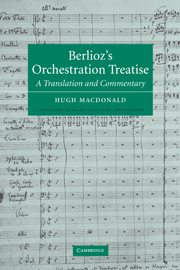Book contents
- Frontmatter
- Contents
- List of illustrations
- Preface
- A note on the edition
- A note on the translation
- Acknowledgments
- List of abbreviations
- The Treatise
- Introduction
- 1 Bowed strings
- 2 Plucked strings
- 3 Strings with keyboard
- 4 Wind: Introduction
- 5 Wind with reeds
- 6 Wind without reeds
- 7 Wind with keyboard
- 8 Brass with mouthpiece
- 9 Woodwind with mouthpiece
- 10 Voices
- 11 Pitched percussion
- 12 Unpitched percussion
- 13 New instruments
- 14 The orchestra
- 15 The conductor and his art
- Appendix: Berlioz's writings on instruments
- Bibliography
- General index
- Index of Berlioz's works
15 - The conductor and his art
Published online by Cambridge University Press: 22 September 2009
- Frontmatter
- Contents
- List of illustrations
- Preface
- A note on the edition
- A note on the translation
- Acknowledgments
- List of abbreviations
- The Treatise
- Introduction
- 1 Bowed strings
- 2 Plucked strings
- 3 Strings with keyboard
- 4 Wind: Introduction
- 5 Wind with reeds
- 6 Wind without reeds
- 7 Wind with keyboard
- 8 Brass with mouthpiece
- 9 Woodwind with mouthpiece
- 10 Voices
- 11 Pitched percussion
- 12 Unpitched percussion
- 13 New instruments
- 14 The orchestra
- 15 The conductor and his art
- Appendix: Berlioz's writings on instruments
- Bibliography
- General index
- Index of Berlioz's works
Summary
Music may claim to be the most exacting of the arts. Of all the arts it is the hardest to cultivate and its creations are the most rarely presented in conditions which allow one to appreciate their true worth, to see their outline clearly and to learn their inner meaning and real character.
Of all creative artists the composer is almost the only one to depend on a host of intermediaries between him and his audience. These may be intelligent or stupid, devoted or hostile, energetic or lazy; from first to last they can contribute to the glory of his work, or they can spoil it, insult it, or even wreck it completely.
Singers are often accused of being the most dangerous of these intermediaries. That's wrong, in my view. The most to be feared, I believe, is the conductor. A poor singer can only spoil his own part; an incompetent or malevolent conductor can ruin everything. The composer who falls into the hands of a conductor who is neither incompetent nor malevolent must consider himself lucky, since the latter's pernicious influence can affect everything. The most magnificent orchestra becomes paralysed, the finest singers feel frustrated and benumbed, and the excitement and the ensemble vanish.
- Type
- Chapter
- Information
- Berlioz's Orchestration TreatiseA Translation and Commentary, pp. 336 - 365Publisher: Cambridge University PressPrint publication year: 2002

